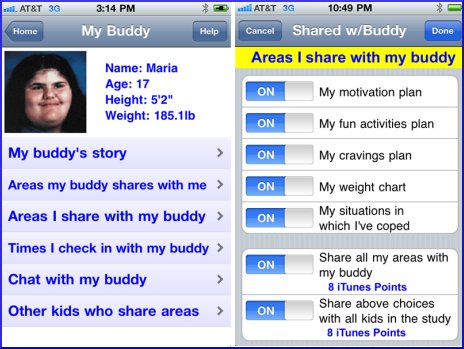
In Australia, Dr. Pretlow’s W8Loss2Go iPhone app is the subject of an 18-week study, with the collaboration of researchers from Flinders University, Medical Centre, and the Child and Adolescent Mental Health Service (CAMHS). As we mentioned, bariatric surgery patient Ellen Burne spoke out in favor of using apps to Sarah Garvis of Southern Health News:
Ellen said apps like W8Loss2Go would be an invaluable support for young people battling to get their weight under control. ‘I found myself looking for support from people who really didn’t understand what I was experiencing so having the buddy system would help immensely.’
The Australian youth who take part in this study are each linked with a compatible peer located in the United States, and possibly that in itself will be interesting enough to provide some of the participants with new enthusiasms and outlooks. The iPhone app is based on the substance-dependence treatment model, and it is a long-term tool, so it has these things in common with such 12-step programs as Alcoholics Anonymous, which rely heavily on fellowship and mutual help among the enrollees.
The importance of pairing up with a “buddy” became obvious to Dr. Pretlow years ago, through his Weigh2Rock website, which offered an earlier version of what would evolve into the W8Loss2Go program. In Overweight: What Kids Say, there is a whole page of examples of comments contributed by kids, about the importance of having a buddy. Dr. Pretlow wrote:
Very early in the history of the site it was observed that the kids, on their own, sought weight loss buddies on the bulletin boards. They highly value the support of a web buddy in their struggle to lose weight, as they may not receive support from their family or friends. They email each other or chat live in the chatrooms or interact via ‘instant messaging,’ which is a one-on-one private chat.
Admittedly, this approach can also have a downside, as Dr. Pretlow deduced from previous observation and experience. The buddy system works optimally if the determination and success rate of the partners are evenly matched. If one progresses exceedingly well, reaches the goal, and moves on to different pursuits, the other is left behind with no buddy. Or if one is flailing and becomes discouraged enough to drop out, the remaining buddy is deprived of companionship.
In the context of a supervised study with a predetermined endpoint, this should not be a problem. An earlier six-month pilot study of W8Loss2Go included 44 obese youths, and here is what Dr. Pretlow noted about that:
Each participant was assigned a weight loss buddy within the study group, with private chat interaction via the app. A group message board provided peer support. The weight loss buddy feature of the app was under-utilized with reasons given including, ‘not knowing what to say’ and ‘not being friends.’
Nevertheless, members of the group had positive things to say about the experience, such as:
I think that the text a buddy is kinda fun to not only get a little motivation but also possibly make a new friend.
The group support lets you know that you‘re not the only one fighting to lose weight. It makes you feel better knowing that there are people that are cheering for you and are ready to help you through the hard times.
The report on the earlier six-month trial, titled “Compulsive Eating/Food Addiction Intervention for Obesity Implemented as a Smartphone App: a Pilot Study,” was written by Dr. Pretlow and Carol M. Stock, JD, MSN. It also included the interaction between the subjects and an investigator who engaged them in weekly 15-minute phone conversations.
There was also online communication on a daily basis, and the participants were given the contact information to get in touch with their professional team members as needed. However, the report says:
No participants spontaneously contacted investigators during the study for help in regard to weight struggles, even though participants were encouraged to do so, app eRoom access was always available, and investigators’ contact info was provided.
For the Australian study, participants have the opportunity to chat online with paediatric nurse Kerri Sutton, who says:
This research will help us learn more about how we can harness the power of mobile health technologies to engage with young people and keep them motivated towards addressing their very serious health problems.
Your responses and feedback are welcome!
Source: “Compulsive Eating / Food Addiction Intervention for Obesity Implemented as a Smartphone App: a Pilot Study,” Karger.com, 06/23/13
Source: “Mobile app boosts weight loss,” Southern Health News, August 2013

 FAQs and Media Requests:
FAQs and Media Requests: 











